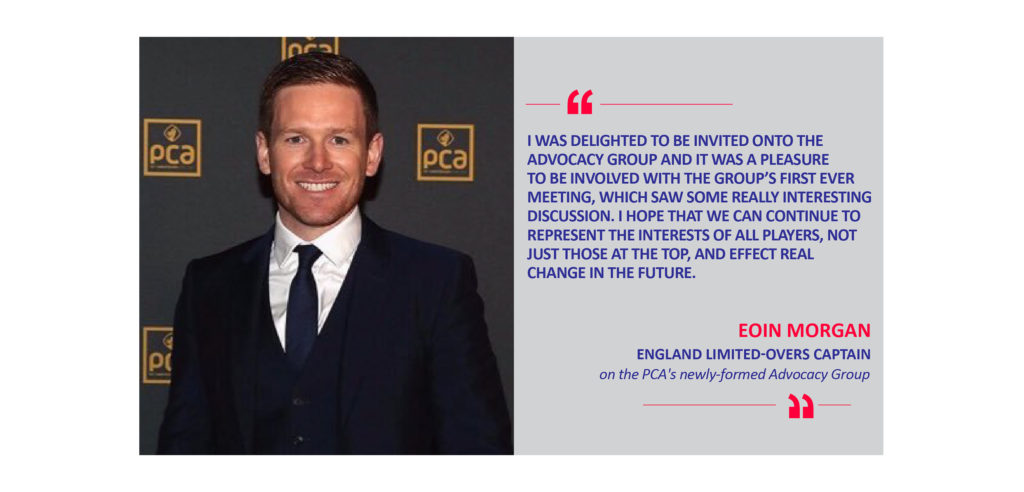Photo Credit: Professional Cricketers’ Association
Key issues discussed at first meeting of new player group.
The PCA’s Advocacy Group has met for the first time to bring together player opinion on some of the most important issues facing professional cricket.
The aim of the newly formed group is to gather views from the PCA playing membership, and PCA members who have moved into various roles including coaches, officials, media, and business.
The newly formed group is drawn from a broad cross section of the professional game to encourage diversity of thought, in order to shape the views of the PCA that will be fed into the ECB Performance Cricket Committee and Professional Game Group.
The PCA’s ambition is for the group to become a leading voice within the game, that will represent the views of the players with the ECB, MCC, ICC and other key stakeholders when necessary.
Chaired by PCA Director of Cricket Operations Daryl Mitchell, the members of the Advocacy Group are as follows:
- Eoin Morgan
- Chris Jordan
- Alex Hartley
- Amar Virdi
- Darren Gough
- Alex Wharf
- Heather Knight
- Ryan ten Doeschate
- Keaton Jennings
- Charlotte Edwards
- Jamie Dalrymple
The Advocacy Group recently met for the very first time via conference call, and the key discussion points were as follows:
Short pitched bowling review
Mitchell advised the group that an MCC survey was to be sent out to all members during the week of the meeting, and sought the group’s views on the suitability of short-pitched bowling within the modern game.
The group agreed that the MCC was absolutely right to do a review, but felt that the bouncer is an integral part of the game at elite level and an important factor for keeping a good balance between bat and ball.
The Advocacy Group called for stricter regulation of protective equipment, especially in regards to testing against genuine fast bowling above 80mph. The group also noted that there is a lack of protective equipment designed to suit the needs of women cricketers, and stated the need for further research into head strikes and the long-term effects on player welfare.
Women’s domestic player issues
With 41 new female domestic cricketers having joined the PCA last year, the group highlighted the need to better understand the issues that the new members are facing.
Members of the group highlighted issues around training facilities and payment structures, and there was support for the PCA submitting a paper to the ECB highlighting inequalities in the women’s game, whilst also calling for more funding and a clearer strategy.
England bubble policy
The group praised the ECB’s handling of bubble policy and the rotation of players in particular, with the new policy of opting in for 2021 a huge step forward compared to opting out in 2020.
The need for bubble-focused psychological support, both for players and officials, was highlighted to complement the work of existing sport psychologists.
The Hundred
The issue of player discontent at perceived local bias during The Hundred draft was raised, and there was support for a paper and proposed review of The Hundred governance and draft mechanisms.
IPL player salary deductions
There was support for the PCA’s current stance of requesting a review of non-centrally contracted players’ participation in the IPL, and agreement that the current regulations are outdated and need to be updated.
Player discipline
With the number of fixed penalty offences at a high level during the opening period of the season, there was discussion around the relationship between perceived poor umpiring decisions and subsequent dissent from the players.
The general feeling was that poor umpiring is not an excuse for poor behaviour and that the two issues should be addressed separately.
The PCA is to request more transparency from the ECB on umpiring decision-making data, and the PCA is to gain more insight into the role of the match referees and their relationship with umpires.
Advocacy Group Chair, Mitchell, said: “It is vital that players of all ages and backgrounds continue to have a voice on the most important issues currently facing professional cricket, so I’m delighted to Chair the Advocacy Group to engage with key stakeholders on critical issues across the game.
“Though our first meeting was virtual, it was great to catch up with what is an engaged and diverse group of individuals, and I look forward to continuing to work with the Advocacy Group moving forwards to influence decision-making processes.”
England limited-overs captain, Morgan, said: “I was delighted to be invited onto the Advocacy Group and it was a pleasure to be involved with the group’s first ever meeting, which saw some really interesting discussion. I hope that we can continue to represent the interests of all players, not just those at the top, and effect real change in the future.”

Photo Credit: Twitter photo of @Eoin16
PCA Vice Chair and England Women captain, Knight, said: “The women’s game continues to grow at a rapid rate, exemplified by the introduction of the new domestic structure and the induction of 41 new female members into the PCA last year.
“It is therefore crucial that the views of women’s cricketers continue to be represented through the Advocacy Group, so we can ensure that the game continues to grow in a fair and sustainable way for all.”
Members of the PCA Advocacy Group will remain in constant contact and aim to meet twice a year, with one further meeting scheduled for 2021.
Name of Author: Professional Cricketers Association
The Professional Cricketers’ Association (PCA), founded in 1967 by former England fast bowler Fred Rumsey as the Cricketers’ Association, represents past and present first-class cricketers in England and Wales. In the 1970s, the PCA established a standard employment contract and minimum wage for professional cricketers. It also helped create a pension scheme in 1995 and launched the magazine All Out Cricket and the ACE UK Educational Programme in 2002.
















































